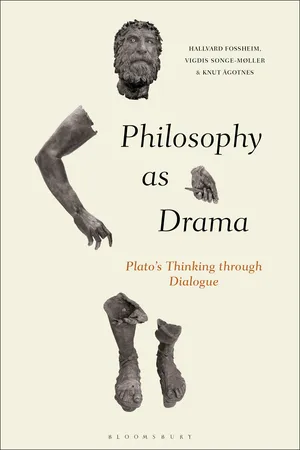
Philosophy as Drama
Plato's Thinking through Dialogue
- 264 pages
- English
- ePUB (mobile friendly)
- Available on iOS & Android
Philosophy as Drama
Plato's Thinking through Dialogue
About this book
Plato's philosophical dialogues can be seen as his creation of a new genre. Plato borrows from, as well as rejects, earlier and contemporary authors, and he is constantly in conversation with established genres, such as tragedy, comedy, lyric poetry, and rhetoric in a variety of ways. This intertextuality reinforces the relevance of material from other types of literary works, as well as a general knowledge of classical culture in Plato's time, and the political and moral environment that Plato addressed, when reading his dramatic dialogues. The authors of Philosophy as Drama show that any interpretation of these works must include the literary and narrative dimensions of each text, as much as serious the attention given to the progression of the argument in each piece. Each dialogue is read on its own merit, and critical comparisons of several dialogues explore the differences and likenesses between them on a dramatic as well as on a logical level. This collection of essays moves debates in Plato scholarship forward when it comes to understanding both particular aspects of Plato's dialogues and the approach itself. Containing 11 chapters of close readings of individual dialogues, with 2 chapters discussing specific themes running through them, such as music and sensuousness, pleasure, perception, and images, this book displays the range and diversity within Plato's corpus.
Frequently asked questions
- Essential is ideal for learners and professionals who enjoy exploring a wide range of subjects. Access the Essential Library with 800,000+ trusted titles and best-sellers across business, personal growth, and the humanities. Includes unlimited reading time and Standard Read Aloud voice.
- Complete: Perfect for advanced learners and researchers needing full, unrestricted access. Unlock 1.4M+ books across hundreds of subjects, including academic and specialized titles. The Complete Plan also includes advanced features like Premium Read Aloud and Research Assistant.
Please note we cannot support devices running on iOS 13 and Android 7 or earlier. Learn more about using the app.
Information
Table of contents
- Cover
- Half-Title Page
- Series Page
- Title Page
- Contents
- List of Contributors
- A note on transcribed Greek versus Greek fonts
- Preface
- Introduction
- Part 1 Genre and the Philosophical Dialogue
- 1 The Whole Comedy and Tragedy of Philosophy: On Aristophanes’ Speech in Plato’s Symposium
- 2 A Praise of the Philosophical Written Speech? Ethics and Philosophical Progression in Plato’s Symposium
- 3 Socrates’ Appeals to Homer’s Achilles in Plato’s Apology of Socrates and Crito
- 4 Plato’s Ring of Gyges and Das Leben der Anderen
- Part 2 Virtue and Soul-shaping
- 5 Plato’s Inverted Theatre: Displacing the Wisdom of the Poets
- 6 Gods, Giants and Philosophers: On Being, Education and Dialogue in Plato’s Sophist 245e6-249d5
- 7 Philotimia. On Rhetoric, Virtues and Honour in the Symposium
- Part 3 Reason and Irrationality
- 8 The Significance of the Ambiguity of Music in Plato Kristin Sampson
- 9 Pleasure, Perception and Images in Plato Cynthia Freeland
- 10 The Limits of Rationality in Plato’s Phaedo Hallvard Fossheim
- Part 4 Place and Displacement
- 11 Place (topos) and Strangeness (atopia) in the Phaedrus Erlend Breidal
- 12 Hunt: Method and Metaphor. A Reading of the Sophist 216a1-226a6 Gro Rørstadbotten
- 13 Plato’s Sophist: A Different Look John Sallis
- Index
- Copyright